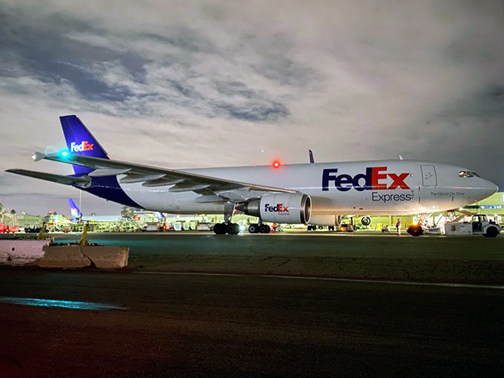
A FedEx plane arrives at LAX with the county’s first doses of the COVID-19 vaccine.
By Mary O’KEEFE
The COVID-19 vaccine has arrived in Los Angeles and staff members at USC Verdugo Hills Hospital have rolled up their sleeves, ready for their shots.
“Our plan is to pick up [the vaccine today] and start rolling it out to staff,” said USC-VHH CEO Keith Hobbs.
The hospital will be receiving the vaccine in phases; the first will have about 475 doses then, gradually over the next four weeks, more will arrive until the hospital has 2,500 doses. The vaccine is administered in two doses, 21 days apart.
Workers in the most critical units, like those working in the Emergency Department and ICU [Intensive Care Unit], will receive the vaccine first. Then it will be given to other staff members; however, not all members in a specific unit will get it at the same time due to concerns about possible side effects. According to the Centers for Disease Control and Prevention, common side effects of the COVID-19 vaccine include pain and swelling in the area of the shot. Other possible side effects can include fever, tiredness and headache. These side effects are similar to those associated with the flu shot.
Hobbs will be in one of the first groups to receive the vaccine. The decision was made after a staff meeting was held when staff shared they wanted Hobbs to receive the shot. Whether or not to be vaccinated first has been a dilemma for many leaders; some feel their staff should be given the vaccine first while others want to be administered the shot first as a show of confidence and support.
Hobbs added it is important for leaders to demonstrate a strong stand of support regarding the vaccine.
Dr. Anthony Fauci, director National Institute of Allergy and Infectious Diseases, has said he will take the vaccine soon because people told him they would take the shot if he did. Former Presidents Barrack Obama, George W. Bush and Bill Clinton have reportedly stated they will receive the vaccine on television to promote the safety and importance of the vaccination.
Getting the public to trust a vaccine is nothing new. In the 1950s the polio vaccine was approved and although many took it several young adults did not; so on “The Ed Sullivan Show” in 1956, Elvis Presley took the vaccine for all to see.
Getting as many people vaccinated as quickly as possible is key for medical personnel.
“Our volume [has increased],” said Hobbs of COVID-19 related cases at USC-VHH. “We are seeing greater numbers now than in March and April.”
He added that, although the numbers are higher, hospital staff has learned a lot since the pandemic first began, both in treating the virus and controlling its spread.
“There are 42 [COVID-19 patients] in house but only two are on ventilators and four in the ICU,” he said.
It is thought the higher numbers are a response to the travel and gathering people did during Thanksgiving; this increase is expected to wane a little but to build back up after the Christmas holidays.
Hobbs echoes the concerns of many in the medical field that over the next few months the numbers of COVID-19 hospitalizations will increase throughout LA County and the nation. There is also a concern about COVID fatigue, that people will think that because there is a vaccine they no longer have to follow the guidelines outlined by LA County Public Health.
“You’ve heard it all before, but the answer remains the same: masking. Distancing. Sanitizing. It is simple ¬– yet often difficult … difficult because we are all weary. We are all tired of not being able to physically be with our friends and loved ones. We are done with COVID-19. But as I tell my staff at the hospital ¬¬– COVID-19 is not done with us. If each and every one of us could truly dig deep and continue with these simple things, we could turn this trend around before the end of the year,” Hobbs stated in a release from USC-VHH.
He added that though his staff is seeing the end of the tunnel it has taken a toll on them. For his part, he has tried to continue outreach with staff including the hospital’s Care for the Caregivers program. It has a 24/7 hotline available for staff members who need someone to speak with concerning mental health issues. There is also a virtual grocery store where staff members who do not have time to shop can order groceries and have them delivered to the hospital so they can take them home. Hotel rooms can be secured for staff who cannot stay at home because they have at-risk family members and some staff members are able to cash-out vacation time to give them funds in case a member of the family has lost his/her job.
In the meantime, more vaccine is being delivered throughout the U.S. as more companies receive FDA [Food and Drug Administration] approval. Pfizer’s vaccine has been approved and, as of press time, approval was expected for Moderna’s vaccine. Several more companies are preparing to have their vaccines reviewed.
The plan is for first responders to receive the initial doses of the vaccine, followed by those in nursing homes; however, according to reports, it will most likely be months before the general population receives the vaccine.
